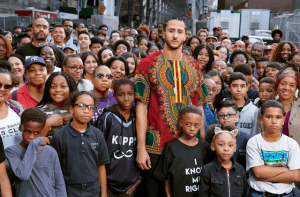
For a long period of time, there has been a long-existing history of an unfathomable and a silently raging rift between Africans and African-Americans or “Afro-Americans,” as some now refer. It should be noted that the relationship between these two races can never be erased or forgotten even though there seems to be a discouraging high-level of historical ignorance or lack of in-depth understanding, especially amongst the newer generations of both races. The connection between Africans and African-Americans goes quite a long way prior to the era of slavery, which I believe warrants a brief trip down memory lane to refresh some existing knowledge on this subject.
We begin by looking at the words of Audrey Smedley, who believes race or ideas about the difference in human color was developed during the era of African slavery. He believed up until the 18th century, Africans were generally positive people who engaged mostly in farming and cattle breeding. They had industries, arts and crafts, commerce and an existing form of government. After invading Africa, the Europeans realized Africans were better farmers and laborers, and immune to several diseases, which were perfect attributes in high demand within the colonialist world at the time. The colonists understood they needed the prowess and strength of Africans to meet their demands and as such, they developed the idea of transporting them across Europe and America, which was then referred to as the ‘New-World’, knowing they would have no means of escape or return.
According to the UShistory website, the Portuguese began the first slave trade agreement in 1472, which saw an influx of over 11 million Africans into America and across a few European nations as slaves. African slave trading became a lucrative business avenue amongst the Portuguese, Spanish and Dutch, and after North America was colonized by Europeans, there were vast lands in dire need of labor which led to the purchase of the first permanent African slaves from Dutch in 1619. Due to their physicality and agricultural abilities, the slaves proved to be highly productive on the farms where they mostly cultivated cash crops ranging from sugar, rice and tobacco. This went on for decades until the anti-slavery movement began which subsequently led to the Civil War in 1861, the Preliminary Emancipation Proclamation by President Abraham Lincoln on September 22, 1862, and an adoption of the 13th Amendment of the constitution in 1865 which outlawed all slave trade practices.
After the abolition of slave trade, issues of race got more intensified due to the non-acceptance of black people and has since become the central point of human attention, interaction and relationship. It constituted the major form of human identity, a discouraging phenomenon that still gallantly exist in our world today. The creation and addition of a new race in form of Africa-America started a new chapter in human existence and history, which has led to a whole new level of feisty societal restructuring, rebalancing and rearrangements till date. Although whenever issues relating to racial differences arise, most people would most likely always refer to the forever existing tensed-filled relationship between African-Americans and the White race, but not so many would consider the possibility of any discord between other races, most especially Africans and African-Americans. To this end, I will be explaining a few reasons for the existing rift between Africans and African-Americans.

The first reason to consider is the comparison debate between Africans and African-Americans, about who have suffered or continuously suffers the most. We begin by considering the latter’s historical slavery struggles which has obviously spilled over and transformed into the present-day inequality and inequity they are continuously forced to endure. History clearly made us realize the dehumanizing and disheartening low-level of inhumane treatments and conditions they had to go through before the abolition of slavery, and it is no longer news that the present American structure and system is continuously finessed to favor Caucasians who are majority over the minority blacks. With this understanding, some African-Americans always see African immigrants as opportunist who are profiting from their struggles despite not having shared in their pains or experienced the horrible and derogatory racial discriminations like they did, which is a reason for their mutual relationship with White Americans. They believe Africans do not share in their ideology and are unwilling to participate in their political and civil rights movements.
On the other hand, Africans continuously grieve their pathetic level of underdevelopment which evidence suggest came as a result of the European invasion. As earlier stated, the entire African continent was developing at a steady pace but lost the plot when valuable human and material resources were taken by the colonialists. According to Nathan Nunn, slavery is the major factor for Africa’s underdevelopment till date; a phenomenon which has created ethnic fractionalization and undermined the effectiveness of several African nations. Recent studies suggest Africa’s 72% average income gap with the rest of the world would not have existed if not for slave trade. He believes the reason for the continent’s poor economic performance is due to the effect of slave trade and colonialism which has led to the endless poverty and incessant conflict, poor leadership, lack of basic social amenities and infrastructure, over dependency on foreign aid, poor health and educational facilities, amongst other challenges. It also affects the present cultural and social outcomes of the continent responsible for the present ethnic division, trust concerns, HIV prevalence, ethno-religious differences, and the high rate of polygyny (i.e. a practice of men having multiple wives) amongst other factors that continuously push the continent aback.
Another reason to consider is the trust issues that exits between the two races. So many African-Americans have some misconceptions that Africans cannot be trusted due to their willingness in allowing their fellow brothers and sisters be taken or sold into slavery, while some perceive them to be highly promiscuous due to the high rate of polygyny in the region. To point out the fallacy with the former, studies have revealed that majority of African slaves were captured through acts of kidnappings, raids and warfare, and through judicial processes, while only a few were literally sold by their relatives or friends as slaves. To address the latter, several studies have identified the trans-Atlantic slave trade as the major factor for the high prevalence of polygyny because only men were initially captured and sold as slaves across America which consequently resulted in the decrease amongst the male population and further tilted the sex ratio in many African nations most especially within West and East Africa.
Furthermore on the factors to consider, there is a wide belief or notion amongst Africans about African-Americans misusing their available opportunities despite enduring numerous challenges and difficulties. It is important to note that Africans alongside other races also, share in the belief that America is a land of dreams and opportunities and will always be a dream destination for many. For Africans, one major reason why they migrate to the U.S. is centered around education due to the outstanding level of human and material resources invested in this sector. As widely known, education remains one of the best and golden ticket to living a better life as individuals, which also helps improve the socio-economic growth and development of the community. Another reason why Africans migrate to the U.S. is because of the availability of several decent job opportunities for both legal and undocumented immigrants. By either migrating for job purposes or education, they remain great opportunities that most likely guarantees any individual to live a long, healthy and happy life.

On the other hand, some African-Americans blame the continuous influx of African immigrants into the U.S. to have negatively impacted the number of jobs that is available to them. According to the National Bureau of Economic Research (NBER), the early immigrant influx into the U.S. between 1980-2000 resulted in 20% to 60% wages decline, 25% employment decline, and 10% rise in incarceration rates among blacks with high school education or less. Based on these statistics, it is understandable to see the plights and frustrations amongst African-American populations, but the increase in the incarceration rates could also be attributed to the heavy trafficking of crack cocaine within black communities which caused the police to enact and enforce tougher sentencing laws and subsequently resulting in the incarceration of one-quarter of low-skilled black men.
On a light note, the United States Census Bureau in June 2019, confirmed that about 13 million workers have more than one job, while a report by CNBC on February 2019, shows U.S. employers posted the most open jobs of about 7.3 million which was a valid evidence that the U.S. job market is actually strong. Also, according to the political typology survey 2020, 61% supports the notion for the country to continue making changes to give blacks equal rights with Whites, 65% believe immigrants hard work and talents have strengthened the country tremendously, 61% believe most people who want to get ahead can make it if they are willing to work hard, while over 55% believe blacks who can’t get ahead are mostly responsible for their own condition.

Based on this knowledge, it aches the heart to see Africans and African-Americans alongside other races have such a resentful, unfriendly and defensive relationship against one another till date. It is true we have all gone through various levels of hardship, turmoil, and suffering which serves as reasons we continuously hold deep grudges against others, but its high time we looked beyond and move on. In as much as we feel justified about our present bitterness or anger towards certain people or races due to our past experiences, we should remember the adage which says, “Two wrongs can never make a right”. It is almost certain that whenever we cloud our minds with negative judgements before relating with others, we would most likely find a way to justify our negative thoughts about them irrespective of the outcome, as such, we all should always set aside our presumptions, perceptions and judgements when relating with others and it is only through this means, can we look beyond our racial differences and respect each other as humans. It is a shame we are still regressing in this 21st century but we can begin by remembering our past, but not dwell on them because when we do, we are prone to live our everyday lives on them, and history has made us to understand that decisions we make in anger or frustration are those that will take us aback or hurt us for a long time.
